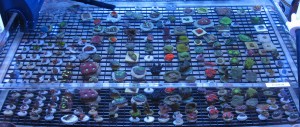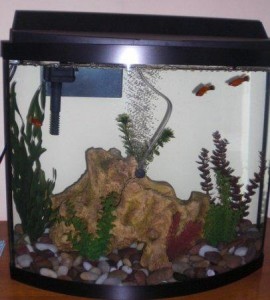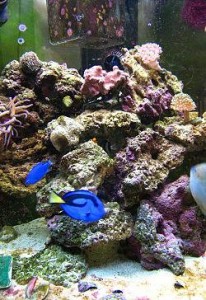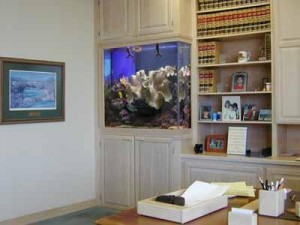Once you get a brand new coral from a LFS or any source, you are too excited to wait until you see the new addition in your main tank. Especially a beginner will want to get it done as soon as possible. However, it is quite important that you understand the species well before mounting in… [Read More]
Conserving Energy in a Reef Tank
The increasing concern of energy conservation is also a major issue for reef keeping hobbyists. While freshwater tank consumes energy through pumps and a small part through lights, saltwater tank, mostly coral keeping ones, can’t do without high intensity lights. And the wattage consumed by pumps are much lesser compared to those consumed by high… [Read More]
Ricordea Yuma – the pretty easy coral

The Ricordea, or commonly called Flower Mushroom Coral, is a member of the order Corallimorpharia. It has beautiful features of short, club, or berry-shaped tentacles. It shares some resemblance to stony hard corals, and is also called a Disc Anemone as they are close cousins of both corals and anemones. It… [Read More]
Monetizing the Reef Keeping Fad

Following a hobby like reef keeping is no inexpensive task. The overall asset you put into maintaining its healthy and uninterrupted growth combined with the price you pay for buying the livestock and equipments can cost you a fortune. The need for high intensity lighting shows up in your electricity bills. Other than real enthusiasts, not everyone might want to… [Read More]
Vitamin C Dosing – The New Trend

There have been talks about the drawbacks on Carbon dosing in older and established tanks. People have supported the system that worked well for them for absorbing Phosphates in reef tanks. Some have preferred vodka, vinegar, bio-pellets, and sugar and manufactured carbon dosing for promoting bacterial growth for consuming ammonia and nitrites. However, they were found to… [Read More]
Living through Power Outage

Power outages due to storm and hurricane can happen anywhere. While most people will have only air-conditioners and refrigerators to worry about, an aquarist will have an extra problem to tackle; making the aquarium survive. If the power outage is scheduled for a few hours, it will hardly make a difference, but those 3 days or more… [Read More]
Culturing Phytoplankton

Phytoplankton is gaining popularity in the world of reef keeping. They are the fundamental organism in the marine food web and considered the staple food for many tiny marine organisms. Phytoplankton is a cluster of photosynthetic plankton composed of several species. Taken as a whole they are helpful as a supply of diet for other tiny organisms with varying features… [Read More]
Converting a freshwater tank into saltwater tank

Do you own a freshwater aquarium that you always wanted to convert into saltwater aquarium but worried that it costs more maintenance? Fact is every kind of aquarium, big or small, needs some level of care and maintenance to keep them healthy and clean. Saltwater tank is no such exception. If you are enthusiastic about turning your freshwater tank into… [Read More]
DIY guide to making concrete reef tank

The new trend in aquarium keeping especially in reef aquariums is building concrete tanks. Why people prefer concrete tank is for their reliability and attractiveness. A concrete tank does not means it is to be made of concrete cement on all sides. The glass aquarium goes in with some precautions and only the display window remains visible in glass. Mostly… [Read More]
Sand shopping for a new tank

For all reef tank enthusiasts here comes the clarification to frequently asked questions on sand bed for reef tank. The substrate part of the tank is not to left undecided when it comes to establishing a new tank. Live sand and dry sand are usually the confusing part for most newbie. The only difference between the two… [Read More]
